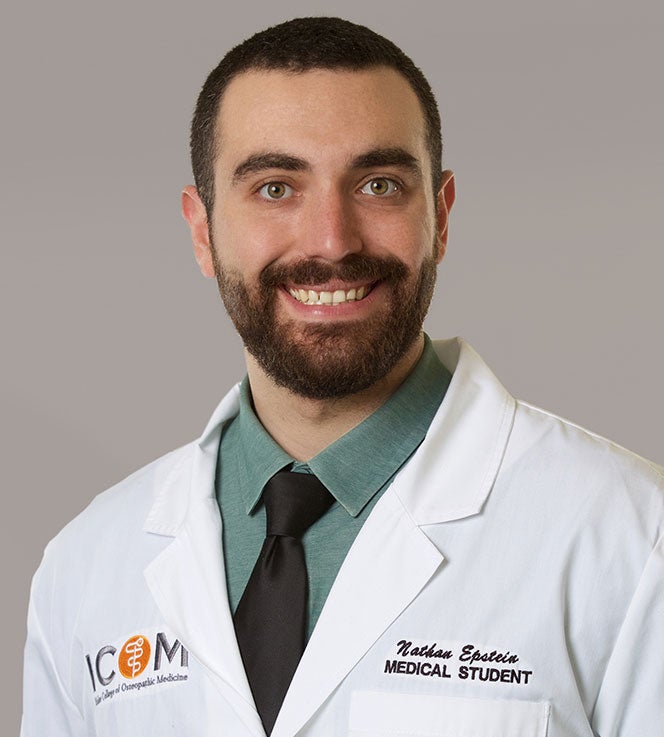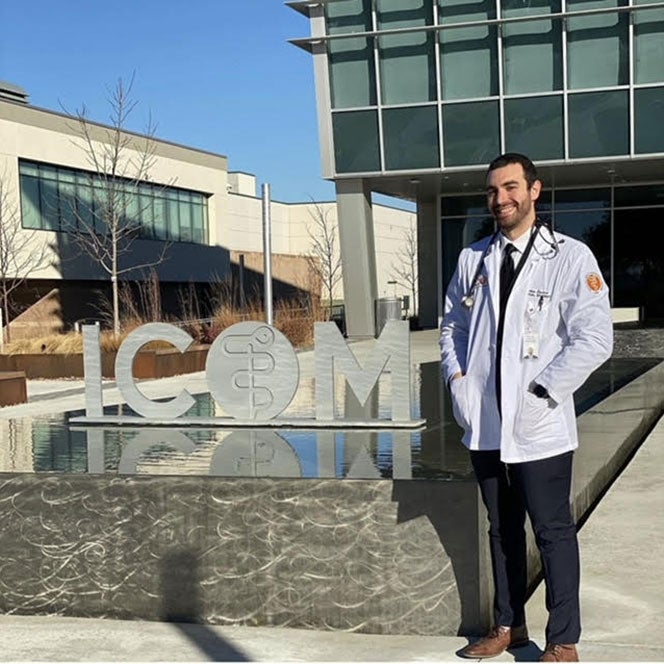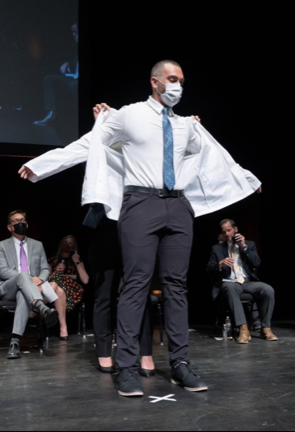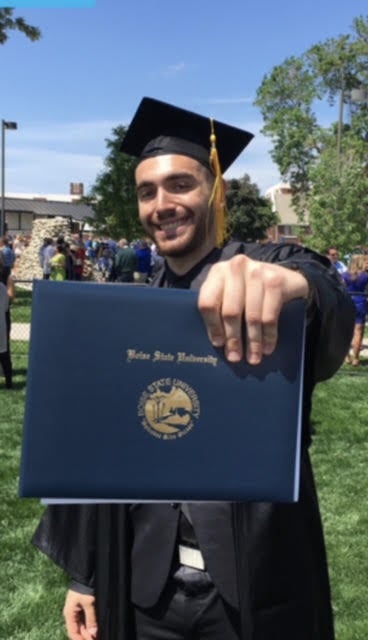
Nathan Epstein, Boise State class of 2016, is showing just what years of relationships and planning — in the hands of a driven and dedicated student — can produce.
A medical doctor, with a passion for helping the community.
Epstein, 29, is now in the third class of the Idaho College of Osteopathic Medicine. And while he knew from a very early age that medicine was in the cards for him — he recalls his toy doctor’s kit, and photos of him using a play stethoscope to examine his grandparents, and notes, “There was never really another option.” — it’s been Idaho, and Idaho higher education, that has helped to bring the dream very close to fruition.
That said, Boise State wasn’t really a destination in the beginning. Raised in Las Vegas, Epstein initially was looking at college in Colorado.
He remembers thinking, “What’s up there, potatoes? … It was the whole nine yards.”
And yet … a good friend was a Bronco, and then his mom suggested he look into it. He drove up on a whim, “and just instantly, it felt like it was home. It was a no-brainer.”

Boise State felt like home. College, however, was an adjustment — an adjustment somewhat abruptly made following a severe concussion early in his first year. After that, it was relatively smooth sailing. Epstein was part of the Health Professions Living Learning Community, served as a resident assistant and received scholarship support.
After earning his bachelor’s degree in biology with human emphasis and chemistry minor in 2016, he went on to graduate school at the University of Kentucky in Lexington. There, he worked in a lab and taught anatomy and physiology to nursing majors. It was a chance to weigh options: research, practice or some combination.
“I wasn’t sure if I wanted to do clinical or bedside work,” Epstein said. “For me, it was a question of how can I feel fulfilled, what fulfills me.”
Returning to Idaho for medical school

And then, Idaho called him back, in the form of the region’s new medical school. Founded about the same time he was getting his Boise State diploma, the Idaho College of Osteopathic Medicine was nearly made to order; its mission is “to train osteopathic physicians prepared to care for persons in Idaho, Montana, North Dakota, South Dakota, Wyoming and beyond.” He is in ICOM’s third class and on pace to graduate in 2024; as of February, and if the numbers hold for the incoming fall cohort, approximately 45 Broncos will have gone on to medical school at the ICOM.
“There was an opportunity to come home,” Epstein said. “There was just really no question, having the opportunity to come back and serve a community that I’m in love with …
“Just a strong sense of community.”
At ICOM, he has found himself is a sea of Bronco blue; by his estimation, more than 10 percent of his class attended Boise State, and his ICOM student mentor is a Boise State grad.
That doesn’t mean they’re in Boise, however, or even in the Treasure Valley. He and others are working their way through four-week clinical rotations in communities in those states served by the college. Reached recently, Epstein was on the move, between a rotation in Aberdeen, South Dakota, and one in eastern Idaho; former Broncos have roomed together during some of these temporary assignments.
Epstein has relished the rural outreach opportunities, and some of the rotations in particular:
“I absolutely have fallen in love working with kids,” he said. “It’s my favorite. It’s just been a cool feeling.”
Boise State and ICOM work well together

If Epstein is any indication, the Boise State culture and the planning that went into design of ICOM are hitting the mark. He’s just what hospitals, health systems, the state of Idaho and its communities want and need: homegrown clinicians with a passion for the place and the people. An affinity for rural life doesn’t hurt.
Epstein notes that having Boise State and ICOM in close proximity to each other has been valuable. Last year, he served as the secretary for the Student Osteopathic Medical Association and returned to Boise State as an adviser to incoming medical students for the group. He also has been involved in application overviews, during which ICOM students have the chance to support aspiring medical students.
“The connection there does exist, and it’s worked both ways,” he said, adding that his instructors at Boise State were always accessible and supportive and “set me up for success … That was something I didn’t know I needed.
“It was a nice, close-knit community. There’s just no better place to live and to develop.”
At this point, Epstein is thinking of a combined internal medicine/peds residency, so that he might become dual-certified. He likes the idea of a fellowship with a patient population; congenital cardiology or congenital nephrology sound compelling.
As for a residency, he favors the idea of research ties to a teaching hospital, and believes he’ll visit the academic side at some point — “I love to teach,” he said.
All of which might take him out of the area — but heck, he’s returned once.
“The most important thing that the pre-meds at Boise State can look forward to is having the ability and the access to just come into ICOM and just set up a tour,” he said.
“The whole faculty are just wonderful and really do take immense pride in building the five-state region …
“The pipeline is there, and there is help. Because getting into medical school is hard.”